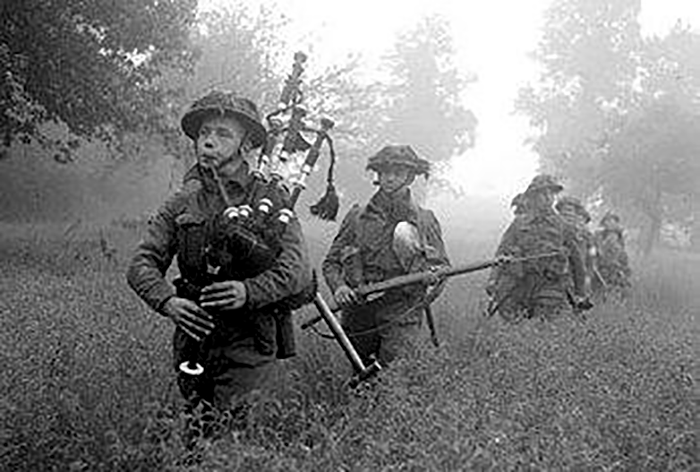
The current hiatus in piping activity, more particularly in pipe band activity, has been likened to a similar fallow period during WW2. What was it like then? In this series piping historian Jeannie Campbell investigates and finds that there was much more going on than might be imagined….
Pipers took their traditions with them wherever they were stationed. A Highland Games was held on the North African shores of the Mediterranean beneath wooded hills shrouded in morning mist and towering above the competition ring.
Tents and marquees dotted around the grounds were reminiscent of the arena at many a Highland gathering, while in the distance the sea’s still waters might have been mistaken by the homesick eye for the waters of the Minch on a sunny day.
In these surroundings, under a cloudless sky at Akarit, were gathered an assembly of all ranks of the Highland Division. They watched as pipers from all battalions marched up and down in front of the judges.
There was a composing competition in which twenty-four pipers played tunes composed by themselves, the winning tune to be a four part 2/4 march named The Highland Division at Akarit.
There were two judges, Major Peter Norwell of the Highland Divisional RASC and Captain Ian Cameron of the Argyll and Sutherland Highlanders. Major Norwell, of Perth, was a piper and was well known for entertaining at concert parties with his Scottish songs.
[wds id=”2″]
Captain Ian Cameron, from Islay. was well known as the winner of numerous solo piping trophies before the war.
The winning composer was Piper Willie MacDonald of the Seaforth Highlanders. He was from Invershin and had been a pupil of Malcolm Macpherson and a member of Bonar Bridge Pipe Band before the war.
The runner-up was Piper Archie Williams from Aberdeen who had joined the Gordon Highlanders eighteen years previously. He too produced an excellent 2/4 march, but probably a little too heavy to be played in a band.
Willie MacDonald’s tune The Highland Division at Akarit is published in William Ross’s Collection Book 4. On the page before it in the same book is Archie Williams’s tune, now named Cairo to Tunis.
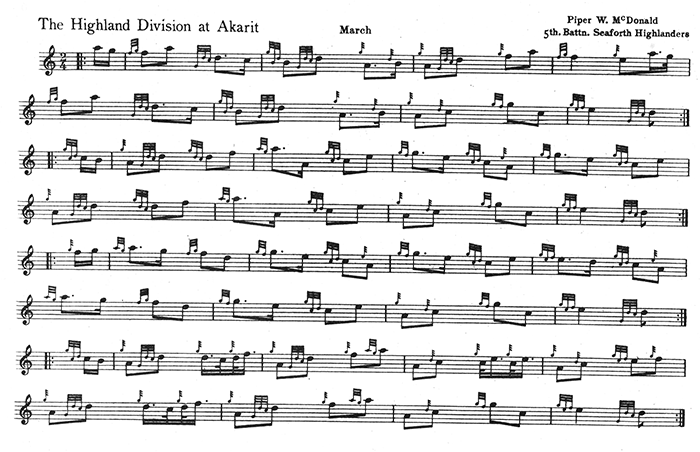
Here’s the tune on YouTube being played by P/M Ian Duncan of the Atholl Highlanders:
Jimmy Young, later a piper with the Edinburgh Police and well-known solo piper and judge, spent the war years in Carstairs in Lanarkshire. Here are his memories:
‘I was a boy living at Carstairs Junction when the war started. I had been learning to play the pipes since the age of nine. I was taught by my father and my uncles.
‘I remember War Weapons Week where they had fancy dress parades with the usual collection boxes and there was always a pipe band. I can remember the Paisley British Legion Pipe Band with Pipe Major Harry Appleby. Another good band I heard was The Royal Scots. They came out for the parades as well.
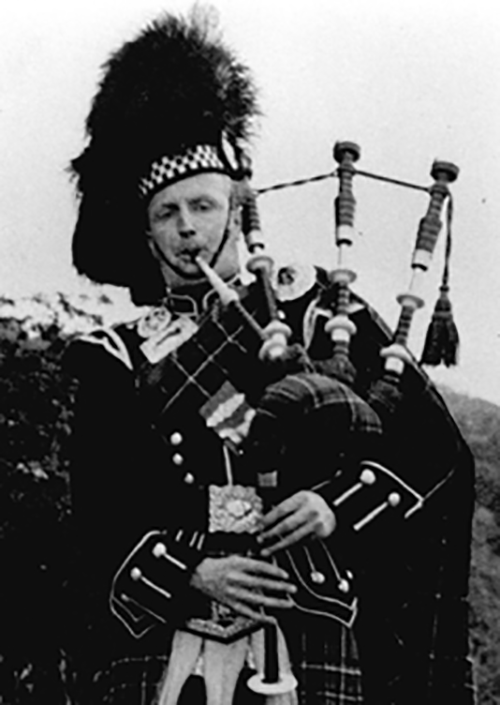
‘I remember the planes going over to bomb Clydebank. We used to listen to Lord Haw Haw on the wireless. One night he said the marshalling yards at Carstairs had been bombed but we only had one bomb dropped near Carstairs and the only casualty was one rabbit.
‘During the war we got our reeds from a man called Frank Bain. He was from Edinburgh but he was a guard on the railway from Edinburgh to Carstairs. My father used to send me up to the station to ask him to bring reeds the following night.
‘My father and I played through the village on VE Day.’
- To be continued. This series first appeared in Pipe Band magazine in 2007.
-
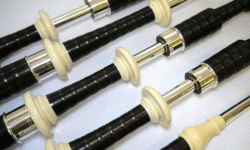 Bagpipes – DN4A – High Quality Set in Plain SilverPrice range: £200.00 through £2,052.00
Bagpipes – DN4A – High Quality Set in Plain SilverPrice range: £200.00 through £2,052.00 -
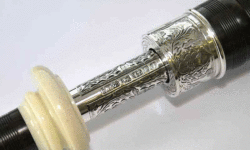 Bagpipes – DN5 – The Finest Bagpipe AvailablePrice range: £300.00 through £3,424.00
Bagpipes – DN5 – The Finest Bagpipe AvailablePrice range: £300.00 through £3,424.00 -
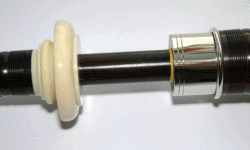 Bagpipes – DN1, High Quality InstrumentPrice range: £100.00 through £1,250.00
Bagpipes – DN1, High Quality InstrumentPrice range: £100.00 through £1,250.00
















One has to love the memories. We all have them, and sharing thereof enriches us all…not the least of the younger pipers and drummers who will have and generate their own to pass along.
The composing contest struck a chord, for we have one ongoing in our band to compose a tune for one of our greatest benefactors. No matter what composition is selected, it’s a fun and valuable exercise in which the learning and experience is more beneficial than what’s selected.